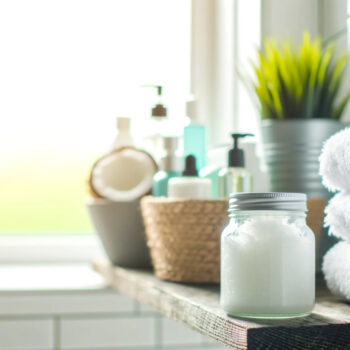Guest writer for Wake Up World
While multiple companies manufacture and market “new and improved” consumer goods that we use every day, such as soap, toothpaste, deodorant and body lotion, one of the best and most natural products has been right under our noses, so to speak.
Coconut oil is an amazingly versatile, therapeutic, and very economical substance with a mild pleasant scent. Coconut oil, like butter, is a solid substance, melting to a liquid form when it reaches about 76 degrees. Insoluble at room temperature, it takes on a creamy consistency when blended with water using a whisk. As long as it is not treated to processes such as bleaching, refining or deodorizing (always buy organic), coconut oil exudes the mild fragrance you would expect — like coconut.
Since around the mid-1990s, coconut oil has become increasingly popular among the health-conscious for a number of personal applications, such as cleansing, deodorizing and healing. In fact, there are a plethora of benefits and applications for raw, organic coconut oil in the bathroom…
2 Kinds of Coconut Oil — Commercial Grade and Virgin
First, it helps to understand how your coconut oil is produced. Regarding its production, there are two basic types: Commercial-grade and virgin coconut oil.
Commercial grade coconut oil — This product is made from copra, which is the dried meat of the coconut. It’s usually smoke-, sun- or kiln-dried or a combination of the three. But when standard copra is used to make coconut oil, it’s not sterile and therefore unsuitable for human consumption.
It’s “purified” or refined through a process known as RBD — refined, bleached and deodorized. According to Coconutdiet.com:[1]
High heat is used to deodorize the oil, and the oil is typically filtered through (bleaching) clays to remove impurities. Sodium hydroxide is generally used to remove free fatty acids and prolong shelf life.
This is the most common way to mass-produce coconut oil. The older way of producing refined coconut oil was through physical/mechanical refining. More modern methods also use chemical solvents to extract all the oil from the copra for higher yields.
Virgin coconut oil — In comparison, like olive oil, coconut oil is best when “first-pressed” and “virgin.” Like pressing a teabag that’s been steeping in boiled water a few minutes, the first water released will contain the most actual extracts.
The second time it’s pressed, as in the teabag analogy, the result isn’t as concentrated. Coconutdiet.com continues:
Virgin Coconut Oil can only be achieved by using fresh coconut meat or what is called non-copra. Chemicals and high heating are not used in further refining, since the natural, pure coconut oil is very stable with a shelf life of several years.
There are currently two main processes of manufacturing Virgin Coconut Oil:
- Quick drying of fresh coconut meat which is then used to press out the oil. Using this method, minimal heat is used to quick dry the coconut meat, and the oil is then pressed out via mechanical means.
- Wet-milling. With this method, the oil is extracted from fresh coconut meat without drying first. ‘Coconut milk’ is expressed first by pressing.
The oil is then further separated from the water. Methods which can be used to separate the oil from the water include boiling, fermentation, refrigeration, enzymes and mechanical centrifuge.
Why Keep Coconut Oil in the Bathroom?
Raw, organic coconut oil, besides being good enough to eat has a plethora of benefits apart from actual ingestion. Here’s a list of 15 benefits of coconut oil, in no particular order:
1. Smooth shave
If you’ve been plagued by red, irritated and razor-burned skin after shaving, coconut oil is both soothing and antibacterial.
2. Rash recovery
Other rash problems from diaper rash to mild allergic reactions can be remedied using coconut oil. Propylene glycol is one chemical found in commercial moisturizers that can cause skin irritation and dermatitis.
3. Lip balm
Use coconut oil to moisturize, nourish and hydrate chapped lips without inadvertently eating endocrine disruptors.
A study on the metal content in lip balm revealed lead, aluminum, cadmium, chromium and manganese in high concentrations, some associated with reproductive, developmental or other adverse health effects.[2]
4. Facial cleanser
Effective as a face wash, mixing equal parts coconut oil and castor oil is known as oil cleansing. Massage it into your skin and remove gently with a warm washcloth.
Ninety percent of the body washes and cleansers you buy contain harmful chemicals such as sodium lauryl sulfate or sodium laureth sulfate, which, in combination with other chemicals, can form cancer-causing nitrosamines.[3]Coconut oil can even improve acne.
5. Makeup remover
Not only can you cleanse your face, you can remove use it as a natural makeup remover — even stubborn mascara and eyeliner.
6. Night cream
While you may not want to use coconut oil under makeup, applying it lightly before bed will hydrate your skin because its fatty acids form a natural emollient. If the skin around your nails is hard and peeling, treat your cuticles to a soothing coconut oil rub to keep them soft.
7. Deodorant
A tiny dab of coconut mixed, if you desire, with an essential oil such as lavender is very effective — so much better than the antiperspirants containing aluminum, which is linked to Alzheimer’s.
Another deodorant recipe combines 3 tablespoons each of coconut oil, arrowroot powder (or cornstarch) and baking soda.
8. Foot fungus fighter
Because it’s antimicrobial and antibacterial, coconut is very effective in combating athlete’s foot. Rub it on the bottoms of your feet after every shower.
Antiviral, antibacterial and antifungal compounds in coconut oil have been shown to inactivate microorganisms such as bacteria, yeast and fungi.[4]
9. Soothing bath
As an alternative to bubble baths that may induce urinary tract infections, especially in children, drop a dollop of coconut oil in your bath with a few essential oils. It’s both moisturizing and helps kill bacteria.
10. Body scrub
Combining equal parts coconut oil with sea salt, sugar or baking soda to make a homemade scrub softens, smoothes and moisturizes your skin.
11. Body lotion
Moisturizers you buy at the store typically contain harmful chemicals such as aluminum, phthalates, parabens, formaldehyde and propylene glycol.[5] Coconut is a fragrant, moisturizing alternative containing none of these.
12. Toothpaste
To combat tooth decay and even whiten teeth, make a DIY coconut oil toothpaste by mixing 1 teaspoon with 1/2 teaspoon baking soda and 2 drops of peppermint essential oil. Just brush as usual.
13. Oil pulling
An oral rinse works much like a mouthwash, only you shouldn’t gargle with it. As you swish vigorously for five to 15 minutes, it penetrates the soft tissue between your gums and “pulls out” bacteria that causes cavities, plaque and bad breath.
14. Protect wounds
When applied to infected cuts or wounds, coconut oil develops a layer of naturally protective chemicals that also keep out dust, fungi, bacteria and viruses. Applied to bruises, it speeds up the healing process in damaged tissues.
15. Frizz fighter
People with hair that tends to frizz often turn to silicone- or alcohol-based gels and mousses, which coat the hair, prevent it from absorbing moisture and dries out the hair shaft. Just a few drops of coconut oil are all you need for a natural hair conditioner for smooth, silky shine.
Healing Properties of Coconut Oil
Virgin coconut oil has been described as having a “haunting, nutty, vanilla flavor (and) even milder and richer-tasting than butter.” A New York Times article noted that coconut oil, while once demonized by the “all saturated fats are bad for you” camp, has now become accepted:
The main saturated fat in coconut oil is lauric acid, a medium-chain fatty acid. Lauric acid increases levels of good HDL, or high-density lipoprotein, and bad LDL, or low-density lipoprotein, in the blood, but is not thought to negatively affect the overall ratio of the two.
… Any number of health claims have been made for lauric acid. According to proponents, it’s a wonder substance with possible antibacterial, antimicrobial, antiviral properties that could also, in theory, combat H.I.V., clear up acne and speed up your metabolism.[6]
Even applied topically, coconut oil has healing properties. One interesting factoid is that while antiperspirants containing aluminum are associated with Alzheimer’s, coconut oil actually prevents it because of the medium-chain fatty acids (MCFA) that are easily absorbed and metabolized by the liver and can convert to ketones. One study noted:
Ketone bodies are an important alternative energy source in the brain, and may be beneficial to people developing or already with memory impairment, as in Alzheimer’s disease (AD) … (It may also) be beneficial in the treatment of obesity, dyslipidaemia, elevated LDL, insulin resistance and hypertension — these are the risk factors for (heart disease) and type 2 diabetes, and also for AD.[7]
Alzheimer’s is projected to affect 1 in 4 Americans in the next generation, rivaling obesity and diabetes, but evidence suggests that ketone bodies in coconut oil may help restore and renew neurons and nerve function in your brain, even after damage has set in.
Unhealthy Alternatives to Coconut Oil
Regarding coconut oil in the kitchen, even as a household cleaner, there are a few points to consider:
• Virgin coconut oil has a smoke point of 350 degrees, so for cooking, it’s best used at lower temperatures. Olive oil overcooks even as low as 250 degrees, which may cause oxidization, doing your body more harm than good.
• You can substitute coconut oil for butter or olive oil, and most definitely instead of so-called vegetable oils. Here’s why:
Multiple studies reveal coconut oil to impart amazing benefits when used in nutritional applications. One of the most dramatic changes you can make in your health will be to replace the so-called “healthy” vegetable, soy, corn and cottonseed oils such as canola when sautéing food or baking cake or cookies.
It’s interesting to note that Polynesian populations, who’ve been using full-fat coconut oil as a diet staple for untold generations, have no heart disease to speak of. Why? It’s a direct contradiction to what conventional medicine touted for a few decades, that saturated fats are bad for you, and will lead to obesity, high cholesterol levels, heart disease and Alzheimer’s.
The truth is, saturated fat like that of coconut oil and olive oil is natural, not the concocted substances created in a laboratory using methods like hydrogenation and partial hydrogenation that convert polyunsaturated fatty acids to trans fats. Vegetable and seed oils undergo the double whammy of hydrogen atoms and high heat, creating a cheaper oil with a long shelf life that’s very bad for your health.
Further, when vegetable oils are heated to a high temperature, the chemical compounds break down, get “stuck” in your cells, oxidize and create dangerous free radicals that lead to disease, including heart disease and cancer. Here’s a timeless article on the type of oil you should cook with.
Article references:
- [1] How is Coconut Oil Produced?
- [2] Concentrations and Potential Health Risks of Metal in Lip Products
- [3] Final Report on the Safety Assessment of Sodium Lauryl Sulfate and Ammonium Lauryl Sulfate
- [4] Coconut Oil Offers Hope for Antibiotic-Resistant Germs
- [5] 10 Toxic Beauty Ingredients to Avoid
- [6] Once a Villain, Coconut Oil Charms the Health Food World
- [7] The role of dietary coconut for the prevention and treatment of Alzheimer’s disease: potential mechanisms of action.
About the author:
 Born and raised in the inner city of Chicago, IL, Dr. Joseph Mercola is an osteopathic physician trained in both traditional and natural medicine. Board-certified in family medicine, Dr. Mercola served as the chairman of the family medicine department at St. Alexius Medical Center for five years, and in 2012 was granted fellowship status by the American College of Nutrition (ACN).
Born and raised in the inner city of Chicago, IL, Dr. Joseph Mercola is an osteopathic physician trained in both traditional and natural medicine. Board-certified in family medicine, Dr. Mercola served as the chairman of the family medicine department at St. Alexius Medical Center for five years, and in 2012 was granted fellowship status by the American College of Nutrition (ACN).
While in practice in the late 80s, Dr. Mercola realized the drugs he was prescribing to chronically ill patients were not working. By the early 90s, he began exploring the world of natural medicine, and soon changed the way he practiced medicine.
In 1997 Dr. Mercola founded www.Mercola.com, which is now routinely among the top 10 health sites on the internet. His passion is to transform the traditional medical paradigm in the United States. “The existing medical establishment is responsible for killing and permanently injuring millions of Americans… You want practical health solutions without the hype, and that’s what I offer.”
Visit Mercola.com for more information, or read Dr. Mercola’s full bio and résumé here.
Recommended articles by Dr. Mercola:
- The Biggest Cause of Anxiety and Depression is Traumatic Life Events
- Zika: Brazil Admits It’s Not the Virus
- Plants Are Smarter Than You Think
- How the War on Drugs Has Caused More Harm Than Good
- The One Size Fits All Vaccination Schedule is Not Safe for Every Child
- Scientific Links Between Processed Foods and Depression
- How Sugar Harms Your Brain Health and Drives Alzheimer’s Epidemic
- The Health Benefits of Intermittent Fasting
- Can a Hug a Day Keep Infection Away?
- Fluoride Deception Continues: US Government Ignores Fluoride’s Role as an Endocrine Disruptor
- Magnesium: An Invisible Deficiency That Could Be Harming Your Health
- Medical Errors: Still the Third Leading Cause of Death
- The Magic Healing Power of Mushrooms
- The Science of Healing Thoughts

If you've ever found value in our articles, we'd greatly appreciate your support by purchasing Mindful Meditation Techniques for Kids - A Practical Guide for Adults to Empower Kids with the Gift of Inner Peace and Resilience for Life.
In the spirit of mindfulness, we encourage you to choose the paperback version. Delve into its pages away from screen glare and notifications, allowing yourself to fully immerse in the transformative practices within. The physical book enriches the learning process and serves as a tangible commitment to mindfulness, easily shared among family and friends.
Over the past few years, Wake Up World has faced significant online censorship, impacting our financial ability to stay online. Instead of soliciting donations, we're exploring win-win solutions with our readers to remain financially viable. Moving into book publishing, we hope to secure ongoing funds to continue our mission. With over 8,500 articles published in the past 13 years, we are committed to keeping our content free and accessible to everyone, without resorting to a paywall.








